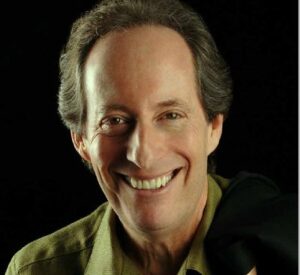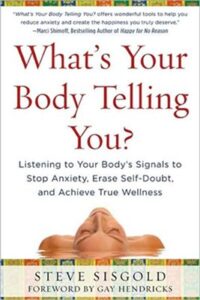 Body intelligence: you have it, but do you use it? I started to appreciate it during several bodywork courses and I notice the impact of authentic nonverbal communication in leadership and change. Hence my interest in Steve Sisgold’s book What’s Your Body Telling You?
Body intelligence: you have it, but do you use it? I started to appreciate it during several bodywork courses and I notice the impact of authentic nonverbal communication in leadership and change. Hence my interest in Steve Sisgold’s book What’s Your Body Telling You?
I think we should bring the body to the workplace. Instead of just using the body to transport our brains to work…. It’s as Steve says in his book: “You have an ally. It is your body.” I liked his book very much, including the simple techniques to access your body intelligence, inner knowing or gut feeling.
Steve Sisgold has helped people access their body intelligence to create better health, prosperity, and more authentic relationships. Steve’s book is a step-by-step guide teaching readers how to raise their WBQ (Whole Body Intelligence).
Before being a successful coach, Steve owned and directed a successful advertising and PR firm, was #1 of 500 salespeople in Konica Corporation, a top 20 sales leader with Shaklee Corp., and a breakthrough coach to best-selling self-help authors and Grammy Award winning recording artists, business leaders, and holistic practitioners. It’s time for a chat with Steve!

Body Intelligence
Everything that happens is registered in our bodies. If we learn how to get out of our heads, we can access our internal guidance system. It is outdated thinking that treats body and mind as separate identities; they are one system. But we learned to repress our inner knowing and rely on the rational mind mostly… with all its consequences. We do things that aren’t good for ourselves and others. We exhaust our bodies, pushing for production. We hurry. We forget to practice empathy. We make decisions that don’t align with who we are. We are not congruent, and may undermine ourselves at work. Or others, for that matter, out of fear, insecurity or hurt.
If anything’s relevant to your effectiveness as a leader, change-maker or consultant: it is your body. It not only determines how convincing or trustworthy you seem to others and thus how much you can achieve but also how good you feel inside and how much energy you’ve got left at the end of the day… It’s one thing to do a job. But it’s another thing to thrive.
Marcella Bremer: Steve, can you tell us how you discovered the importance of the body?
Steve Sisgold: “It all started when I was very young, and I noticed that my dad wanted to buy a store, but my mom was against it – I felt the tightening in my belly, and then I burst out that my dad should do it anyway… It was as if my body took over – it was a deep knowing and excitement that my father should try this venture. And then, later on, when my parents wanted me to be a dentist, but I clearly felt in my body that I didn’t want to do it. I went into business and started working with people: and I noticed they were not breathing.
When I asked: “Tell me about your life, product, mission – they’d hold their breath. Huh… And then, when they were talking, I noticed their bodies were communicating something else. So I started with this question: tell me what you want in your life and then, what is your body telling you in response?
“I want to have a close relationship” – but then you fold your arms before your heart. Interesting, isn’t it? I studied and traveled to go to all kinds of teachers and gurus.
 I kept asking these questions and noticing people’s bodily responses. When something was too overwhelming or hurtful or traumatic – people stopped breathing. They locked the feeling in their bodies, but it stayed with them – for instance if you have to get up for a speech and start to sweat profusely because you were being laughed at as a child. So something from your past keeps you from having what you want in life.
I kept asking these questions and noticing people’s bodily responses. When something was too overwhelming or hurtful or traumatic – people stopped breathing. They locked the feeling in their bodies, but it stayed with them – for instance if you have to get up for a speech and start to sweat profusely because you were being laughed at as a child. So something from your past keeps you from having what you want in life.
I developed WBQ – whole body intelligence. Word just spread – and I started to work with famous people. I help people to breathe and to take in – and express yourself while you breathe out, without blockages.”
Marcella Bremer: So you’re very gifted in body intelligence yourself?
Steve Sisgold: “Well, I am just like anybody else, we all have these challenges. I’m typing and then I’m all crunched up – and my fiancé tells me: Honey, you’re in slump asana. Most of us do that: we’re thinking and working or nervous, and we’re crunched up.
I became aware of the body, and it came organically to me – it intrigued me, and I started to explore how this worked. Nowadays we have the new science and Bruce Lipton explaining how we store experiences in the body – but then I just found out.”
Marcella Bremer: You’ve been working in sales and before you started to be a full-time body coach?
Steve Sisgold: “I was in a corporate job and noticed how body language would turn off the customer. I was intrigued by the 75% of lottery winners in California who lost the money again! They did anything to blow it – it was too much energy for most people. “Ooh, I won the lottery, I am rich!” They somehow wanted to go back to the familiar energy level and their former, comfortable situation of complaining….”
Marcella Bremer: So, in a way, we try to hold on to familiar levels of information and energy?
Steve Sisgold: “Yes, unconsciously, of course. We’re sabotaging ourselves until we become aware. And then we can do something about it.”
Marcella Bremer: So you help people become aware, and the next step is that you offer a few simple techniques in your book?
 Steve Sisgold: “Yes, it is important to breathe well on a daily basis. What happens when you breathe in? That is receiving. Can you receive love, money, acknowledgment, compliments? Breathing out is the same – expressing who you are. Can you ask for what you need? This is connecting the brain and the body again and accessing the knowledge that is stored there. Say out loud what you want and next: notice the body respond. Is there a glitch? “I want to write a book – I want to win this project” – and then listen to what your body has to say.
Steve Sisgold: “Yes, it is important to breathe well on a daily basis. What happens when you breathe in? That is receiving. Can you receive love, money, acknowledgment, compliments? Breathing out is the same – expressing who you are. Can you ask for what you need? This is connecting the brain and the body again and accessing the knowledge that is stored there. Say out loud what you want and next: notice the body respond. Is there a glitch? “I want to write a book – I want to win this project” – and then listen to what your body has to say.
Your body might go: No way! Like the guy who was told that if you are successful, you get sick. Hearing the word “success” was enough to trigger illness for him!”
Marcella Bremer: We’ve been trained to ignore bodily sensations and repress emotions and rely on the analytical, rational mind. For many people there is a disconnect between thinking and feeling. This may be the reason some leaders or consultants are not congruent. They think they have to be dominant or strong – but inside they may feel insecure – so they radiate it. Being aware of the body and their feelings, can help people be congruent and authentic as leaders. Their team members can sense: You are for real – I want to follow you! That’s how I see it, what do you think, Steve?
Steve Sisgold: “That’s right. I’ve been called the master of executive presencing, for that reason. People were promoted, and they couldn’t hold it. They were not congruent. They felt inadequate; they felt guilty, or whatever. That’s what they would express through nonverbal communication, and they were not effective.
 I get these calls from companies: help our people get engaged, they seem burned-out. I help them to reboot a couple of times per day, to get into their body and tune into reality.
I get these calls from companies: help our people get engaged, they seem burned-out. I help them to reboot a couple of times per day, to get into their body and tune into reality.
Like: “When your boss said: Have that ready by 10 AM – I started making assumptions, I started to feel tense…”
It helps to get beyond the fiction in your head – “I’m going to get fired if I can’t make it before 10 AM”.
Go back to what’s real: “My belly feels tight – that’s all. What is my belly telling me?”
Marcella Bremer: Aren’t you mocked when you say: My belly feels tight? Not a common thing to admit in the workplace….
Steve Sisgold: “Then say it to yourself. Of course, in some cultures you can’t say this to your boss. But in those corporations where people are open enough to do these exercises and express how they feel, it helps big time!
Example:
“When you slapped me on the back – it remembered me of my big brother who used to surprise me and jump on me from behind – very scary.”
“Wow, I never knew that. I thought I was complimenting you.”
If coworkers can discuss this, the morale gets better, motivation goes up, there’s more understanding, it becomes safe.”
Marcella Bremer: If everyone would use WBC and breathe and do the techniques, we’d get to know ourselves better. Do you think it would make our workplaces kinder?
Steve Sisgold: “Yes, there’d be more empathy. We all have emotions and histories. If we feel comfortable enough to express how we feel – it will boost innovation and creativity and productivity. There would be less fear and competition and more trust. It would make our workplaces more innovative and productive.
Here’s another powerful question that your body can help answer: What is your deeper purpose and how does that align with your company’s mission?
When I worked in sales my purpose was to get my son through college and support my dream. The job was funding my dream – what you see me do now. So that is very motivational. To align your true purpose with the position you are in. If people start using their BQ – they find their strength and power.”
Marcella Bremer: When you’re not used to sensing your body – you may not get an answer from your body right away. Would that be discouraging? If you have the connection, you can get fascinating insights – as I experienced. But how’s that for people who have not yet developed this body awareness and who live inside of their heads?
 Steve Sisgold: “It already makes a difference if you take a deep breathe and unplug from everything twice a day (“Wow, I’m nervous about that meeting”). Just to do that – going from the sympathetic nervous system, being up in your chest, alert, to down in your belly and to the parasympathetic nervous system. It is stress release! More oxygen to the brain. More creativity. Then you can take it further, and in time you will get more access to the body’s wisdom. “Should I do this investment, yes or no?” Ask your body! Access this inner knowing. And check on your life’s purpose.”
Steve Sisgold: “It already makes a difference if you take a deep breathe and unplug from everything twice a day (“Wow, I’m nervous about that meeting”). Just to do that – going from the sympathetic nervous system, being up in your chest, alert, to down in your belly and to the parasympathetic nervous system. It is stress release! More oxygen to the brain. More creativity. Then you can take it further, and in time you will get more access to the body’s wisdom. “Should I do this investment, yes or no?” Ask your body! Access this inner knowing. And check on your life’s purpose.”
It takes discipline to stop – and check in twice a day… How can we help people do it? Instead of just listen or read this – but not apply the techniques? I find it hard to take the time and stop rushing…
“Number one is to make the commitment to listen to your breath. That’s step one. Second is to scan your body – how is everything – “hey I didn’t know I was crunched up!” The key is to observe and not to judge. “I thought I was relaxed, but now I notice my fist is clenched. Hey, when my boss talks to me – I clench my jaw.” Maybe it reminds me of an authority figure that I wanted to yell back at – so I clenched my jaw and chewed it up.
Start with this – and then say out loud what you want – and listen to the response.
“I want to be a good leader – and I am afraid that no one wants to follow me.”
Disentangle those two – you can have them simultaneously and still move forward. By doing so, you will create new evidence. “Hey – I can lead a group! It is good enough….”
Hey – Marcella – tell me – how is this for you in your work? What is going on and what have you learned?”
Marcella Bremer: Ha – I have learned so much. I used to be insecure, and I’ve come a long way…
Listen to the extended podcast version if you want to hear my take on being present in the moment, feeling comfortable in your body – while doing group work and change consulting. Members can log in to access the audio interview.
Marcella Bremer: Steve, one more question. You are human, too, so you can’t always practice what you preach. What do you find difficult or challenging?
Steve Sisgold: “Good question. Let me take a moment with that (silence). I had a challenge when my mom was sick, and we didn’t agree on how to proceed. I am frustrated about what’s happening in Washington DC (during the Government Shutdown – editor). I come from the sixties’ activism – and I wish there were more consciousness and empathy. I feel challenged by the way people treat each other and their bodies and the environment. Unconsciousness, greed, prejudice, selfishness… People who deny global warming and environmental problems for greed and profit. I try not to get frustrated – a snake sheds their skin only when it’s ready – I know… I try to bless people where they are.
Personally, I can be too attached to a result. I have unconscious behaviors and can be stressed out. But the thing is not to beat myself up about it!
 Do I get angry, scared, disappointed? Absolutely. Do I know how to separate fiction from fact, my assumptions from my body sensations? Yes, absolutely. I know how to breathe my way through it. One of the reasons I’m successful is that I don’t think I am the guru. I like people who tell the truth and share what they have learned, including the mistakes they still make. We are all human! Nothing wrong with that.”
Do I get angry, scared, disappointed? Absolutely. Do I know how to separate fiction from fact, my assumptions from my body sensations? Yes, absolutely. I know how to breathe my way through it. One of the reasons I’m successful is that I don’t think I am the guru. I like people who tell the truth and share what they have learned, including the mistakes they still make. We are all human! Nothing wrong with that.”
Steve Sisgold can be reached through his website.
Marcella Bremer is an author and culture & change consultant. She co-founded this blog and OCAI online.

One Response
Good write-up. Innovative!